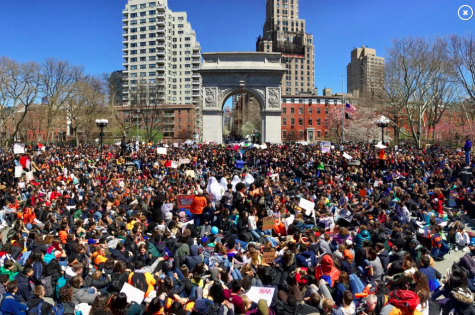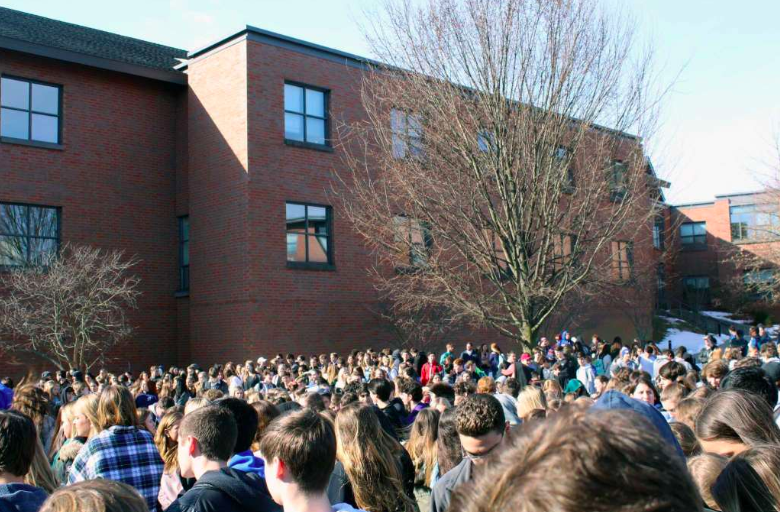The Lasting Impacts and Reactions of the DHS Walkout, Nearly One Year Later
A look back on the controversial walkout that ultimately led to polarization within the student body.
February 15, 2019
Following the tragic shooting at Marjory Stoneman Douglas High School on February 14, 2018, the nation erupted in vicious debate. Our country became the most divided it had been in years. Conversation was hostile; parties became polarized and it seemed as though no one could come to a compromise. Now, nearly one year later, we look back on the tumultuous political climate that once consumed Darien High School.
In response to the shooting, Womens Youth Empowerment called for a National School Walkout to take place exactly one month after the shooting. Students from Darien High School decided to take part in this event, drawing support and criticism from faculty and students alike.
In the days leading up to the walkout, there was a certain electricity in the atmosphere. It was all anyone was talking about, whether at lunch in the cafeteria, or after school at practice. Everyone could sense that something big was happening.
On March 14, members of the DHS community gathered in the courtyard to commemorate the 17 lives lost just one month prior. The organizers of the walkout read speeches about each victim of the shooting, and what their life was like before they died. The rest of the day followed with conversations and debate in classrooms, and no students received punishment for walking out or remaining in classrooms.
Shortly after on April 20, the 19th anniversary of the Columbine shooting, students conducted a non-sanctioned walkout. They marched out of DHS, and traveled into New York City for a protest against gun violence in Washington Square Park. All students who participated received a Saturday detention, as their departure from campus was not condoned by administration.
The debate of gun control has seemingly died down, but it is important to continue the discussion with all opinions considered. With a topic as delicate and politically charged as this, it is vital to hear all sides. Gun control is a sensitive topic that deserves to be discussed and weighed on by everyone.
There was no uniform emotion towards the walkout, but there were major opinions that overpowered others. Many felt as though their ideas and beliefs were suppressed at the time, which is unjust. In order to make their opinions heard, I interviewed a number of students from all sides of the political spectrum.
To a senior who wishes to remain anonymous, I asked: “What was your reaction to the walkout? Did you agree or disagree? Why?”. He responded with, “I am a supporter of peaceful protest and honestly I believe there isn’t enough of it from either side of the aisle. But the walkout that occurred on March 14th, 2018 at 10 am Eastern time, was flawed at its core. The group that launched this walkout disrupted classes for a cause that looked over [sic.] black and white facts”.
The student went on to explain the true definition of an “assault rifle” and its legality in the United States. An assault rifle “is a weapon the military generally uses and has ‘select fire capabilities’. Such weapons have already been banned in the United States”. The student gathered this information from CNBC. He concluded with, “I believe that if a walkout was to be done for the demand of stricter gun laws, it should be done for things that haven’t already been banned.”

I conducted another interview with three seniors, Max Wadley, Caroline Orphanos, and Manvi Malhotra.
“I think it was a really good thing to see kids become politically involved because a lot of people in our school typically don’t realize what is going on in the world, and that these things are impacting students like us,” Orphanos said.
“I was ambivalent about the walkout, mostly because I didn’t know what it was for. It was sort of presented as a memoriam for the students, but there was another conversation, sort of offering that it was a political statement. In my opinion I don’t believe that school is the right environment for a political statement. I think there is a time and a place for everybody to have an opinion, and everyone is entitled to one, but I don’t believe that those opinions should be expressed in a school environment,” Wadley said.
“It was a silent, peaceful memorial, and I think it was effective in raising political awareness and having an understanding of what’s actually been going on. However, it had poor advertisement, but a good execution. It is a difficult issue because gun control has to do with our schools, so I think that’s when politics clashes with our school lives, which is why having the walkout at school made sense for a lot of people,” Malhotra added.
Wadley concluded with an experience he had on the day of the walkout. When asked if he felt as though any opinions were being suppressed, he responded with an unsettling story: “Instead of doing anything that day, we had a discussion about the walkout in one of my classes, which I think is perfectly appropriate to do. I was voicing my opinions about it and why I didn’t walkout because I didn’t know what it was for, my teacher made a comment. They said ‘if you didn’t walkout you wanted to see more kids die’.” This type of suppression of opinions among students is unjust, as all beliefs should be assessed, especially in a classroom.
After having these interviews, I came away with not only new perspectives on the walkout and the issue of gun violence, but also the realization that there are a wide array of opinions at DHS that all deserve to be considered. While they may not coincide with the majority of the student body, a belief or idea must be heard.
